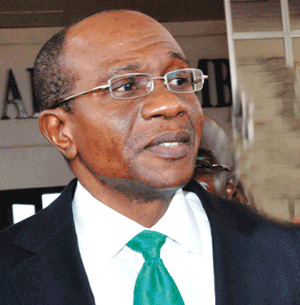By Kelechi Mgboji
Assistant Business Editor
Financial experts expect the naira to stabilise and firm up against the dollar sequel to the foreign exchange (forex) policy the Central Bank of Nigeria (CBN) announced last week.
Expectation is hinged on the new financial instruments the CBN plans to introduce into the forex market.
Derivatives
One of such instruments is Derivatives, a hedge product that mitigates the fluctuation risks of currency exchange trading.
With the events of the past 18 months in which the naira came under heavy speculative attacks, analysts uphold Derivatives as a timely and appropriate instrument to moderate fluctuations in exchange rate.
The value of Derivatives depends on the valuation of an underlying asset – a warrant, an option, et cetera.
It enables contracting parties hedge forex trading risks ahead of maturity date, or the time to make payment or of the need of the forex.
Associate Vice President and Divisional Head Market Development and Regulations, FMDQ OTC Securities Exchange, Olajumoke Olaniran, hinged her expectation on Derivatives because it can cushion forex risks and eliminate speculation on the naira.
She said the naira had suffered speculative attacks due to anxiety which made a lot of businessmen to frontload demand for dollars.
“Now that you have Futures where the price is guaranteed at the exact time and date you need it, you don’t necessarily have to come to the market right now because on the day you execute Futures transactions you’re certain that there will be payment on the maturity date,” Olaniran explained.
How Futures works
Everything happens on the maturity date. If you enter the market today and enter a Futures contract, you are comfortable because you have locked in an exchange rate at which you hope to obtain the hard currency.
Therefore, buyers under Futures contract are not extposed to forex fluctuations on the spot market.
Analysts believe this product is timely to address concerns in the business community which make the players to frontload dollar demand.
The CBN guidelines, Olajumoke explained, allow several other Derivatives like Forwards, Swaps, Options.
“Futures is one that gives you a lot of flexibility such that you can make your choice ahead and decide your price ahead and you are guaranteed the price on the maturity date. It doesn’t matter what the spot rate is on that day.
“You may purchase the form on the spot market but the way the settlement happens is that the differentials paid back to you bring you back to the guaranteed price at the end of the day.
“So, if you entered into a Futures contract for, say, N300 per dollar three months ago, and on the maturity date you have to purchase the currency at, say, N350 per dollar, your counter party on the Futures contract will pay you N50 differential.
“On the other hand, if you have the spot market people selling N280 per dollar, which means you have N20 in your favour but you have been guaranteed N300, you will have to pay your counter party N20.
Impact on economy
An analyst at Financial Derivatives Company (FDC), Opeyemi Oguntade, said what normally happens when there is a shift from a fixed rate to floating exchange rate is that there is imported inflation which filters into the prices of commodities.
In other words, a sharp increase in the prices of imported commodities would have been expected under normal situation.
But Nigeria is a different case, according to Oguntade, because the exchange rate has suffered exaggerated speculation.
Her words: “The value of naira exchange rate at the market is exaggerated at N370 to the dollar.
“So, in the short term, given the fact that the CBN has provided clarity on exchange rate regime going forward, we should expect there will be an appreciation of the naira going forward.
“If this happens, we should expect this to filter into the prices of imported commodities on the market going forward. This implies that the prices of imported commodities will come down as well as the prices of domestic commodities.
“If imported commodities’ prices come down, we should expect that the prices of domestic commodities that are substitutes for these imported items will have to decline also.
“Because traders are in business to make profit by retaining customers and market share.”
Oguntade said there is an increase in the prices of domestic commodities because there is an increase in the cost of living fuelled by the scarcity of forex.
For example, she added, farmers began increasing the prices of commodities like garri to meet the cost of living.
“But now that the CBN has provided clarity on exchange policy, we expect it will filter a decline in prices on the market.”
Oguntade, however, warned that in the long run if the supply of dollar does not meet the demand for forex the economy may still remain in its current situation despite the unified forex policy.
In her view, the government has to consider how to manage inflows and make dollars readily available on the market.
FDC Chief Executive Officer, Bismarck Rewane, also hailed the policy as capable of eliminating market distortions and bringing down prices.
Cowry Assets Management Chief Executive Officer, Johnson Chukwu, added that it would enhance price stability.
“It was most expected though coming late; it is better than nothing. It will lead to inflow of Foreign Direct Investment (FDI) and remittances. This shows we are preparing the economy for diversification,” he said.
Nonetheless, Sherifdeen Tella, a professor of economics at Olabisi Onabanjo University, Ago-Iwoye, Ogun State, warned against leaving everything to market forces.
“Therefore, we still need more restrictions on importation in order to preserve the reserves. We should not buy the idea of free market that will allow just anything to come into the country. Even economies like Japan and the rest still do this.”
Highlights of flexible forex guidelines
1. Appointment of 10 financial institutions as primary dealers with a minimum transaction volume of $10 million; and non-primary dealers with dealership categorised on the volume of transactions they can handle.
2. The CBN to deal primarily with forex primary dealers. The guidelines are on the CBN website.
3. Qualifications include the size of bank or size of previous forex transactions, liquidity, compliance with CBN regulations in the past, and possession of all the soft and hardware needed for a transparent operation.
4. The market to operate as a single structure through the inter-bank/autonomous window.
5. The value of the naira against other currencies would be market-driven using the Thomson-Reuters Order Matching System as well as the Conversational Dealing Book.
6. The CBN to participate in the forex market through periodic interventions to buy or sell forex as occasion demands.
7. No predetermined spread on forex spot transactions executed through the CBN intervention with primary dealers.
8. All forex spots purchased by authorised dealers are transferable on the interbank forex market.
9. The 41 items classified as ‘Not valid for foreign exchange’ remain inadmissible to the forex market.
10. The CBN to offer long-tenured forex forwards of six to 12 months or any tenure to authorised dealers to enhance liquidity.
11. Sale of forex forwards by authorised dealers to end-users must be trade-backed, with no predetermined spreads.
12. To reduce speculative demand for forex for future transactions, the CBN will introduce non-deliverable over-the-counter (OTC) naira-settled futures.
13. Naira-settled futures, a new product in the Nigerian forex market, will help moderate volatility by moving non-urgent forex demand from the spot to the futures market.
14. OTC forex futures to be in non-standardised amounts and different fixed tenors to be sold on any date.
15. Proceeds of foreign investment inflows and international money transfers to be purchased by authorised dealers at the daily inter-bank rate.
16. Non-oil exporters have unfettered access to their forex proceeds sold on the interbank market.













